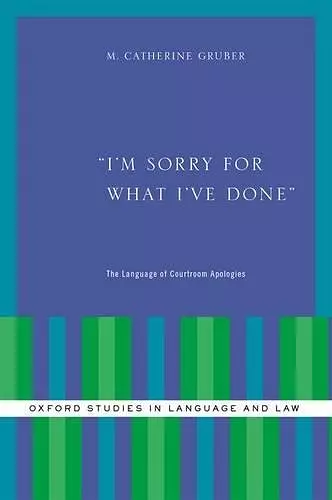I'm Sorry for What I've Done
The Language of Courtroom Apologies
Format:Hardback
Publisher:Oxford University Press Inc
Published:29th May '14
Currently unavailable, and unfortunately no date known when it will be back

This book examines 52 apologetic allocutions produced during federal sentencing hearings. The practice of inviting defendants to make a statement in their own behalf is a long-standing one and it is understood as offering defendants the opportunity to impress a judge or jury with their remorse, which could be a factor in the sentence that is imposed. Defendants raised the topics of the offense, mitigation, future behaviour and the sentence in different ways and this book explores the pros and cons associated with the different strategies that they used. Because there is no way of ascertaining exactly how effective (or ineffective) an individual allocution is, case law, sociolinguistic and historical resources, and judges' final remarks are used to develop hypotheses about defendants' communicative goals as well as what might constitute an ideal defendant stance from a judge's point of view. The corpus is unique because, unlike official transcripts, the transcripts used for this study include paralinguistic features such as hesitations, wavering voice, and crying-while-talking. Among its highlights, the book proposes that although a ritualized apology formula (e.g., "I'm sorry " or "I apologize ") would appear to be a good fit for the context of allocution and even appears to be expected, the use of these formulas carries implications in this context that do not serve defendants' communicative goals. I argue that the application of Austin's (1962) performative-constative continuum reveals that offense-related utterances that fall closer to the constative end are more consistent with the discursive constraints on the speech event of allocution. Further, I propose that the ideologies associated with allocution, in particular the belief that allocution functions as a protection for defendants, obscures the ways in which the context constrains what defendants can say and how effectively they can say it.
I'm Sorry For What I Have Done is accessible at all levels ... an exceedingly interesting read. * Sarah Morley, LSE USAPP31/08/14 *
I have no hesitation in recommending it to any student of language. * Joe Sinclair, New Nuturing Potential *
invaluable resource for students, teachers and researchers in the domains of linguistics and law * Guofeng Wang, Discourse Studies *
ISBN: 9780199325665
Dimensions: 164mm x 240mm x 26mm
Weight: 463g
256 pages